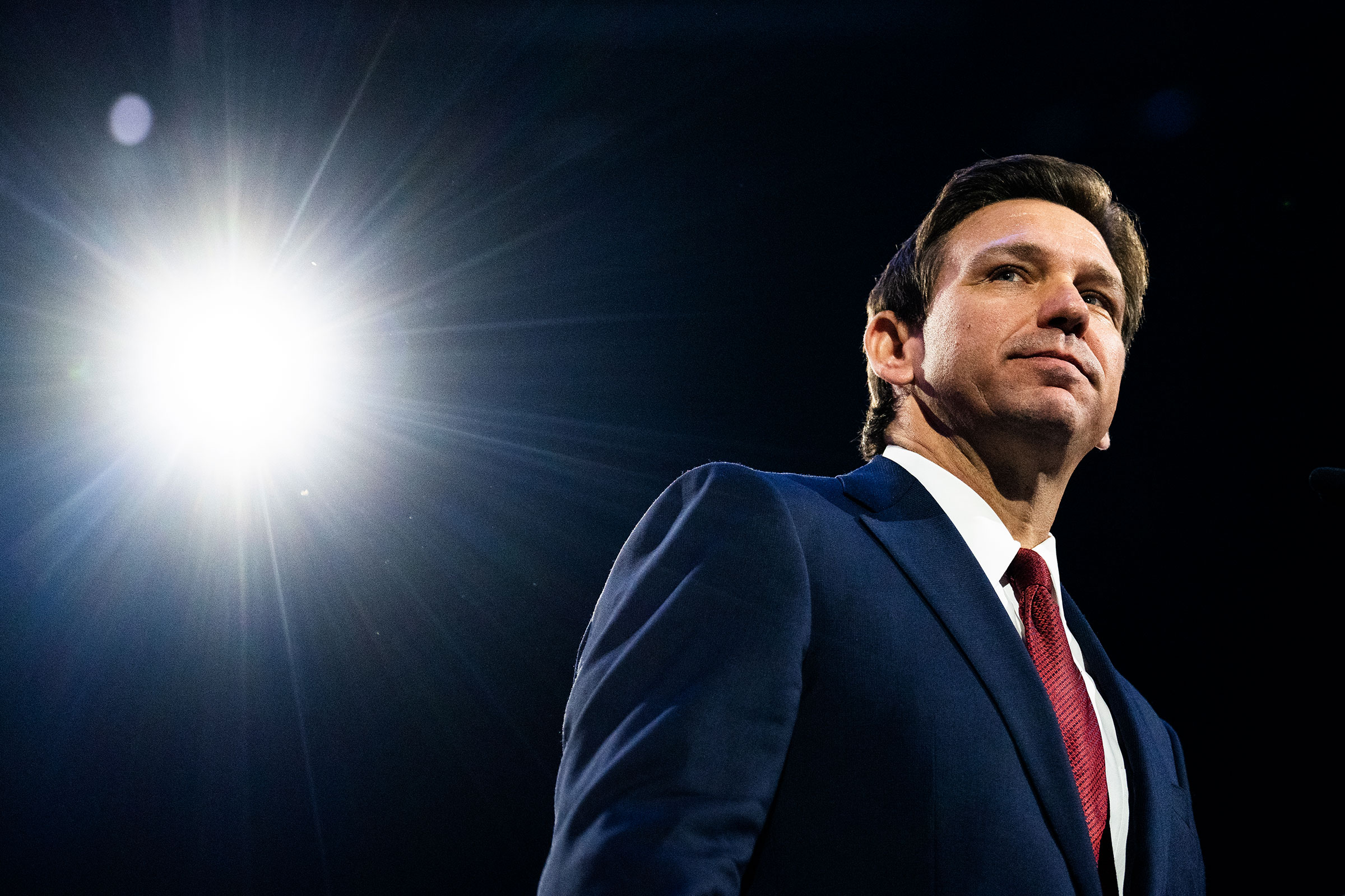It’s a Tuesday morning in Tallahassee, and a wood-paneled hearing room at the Florida legislature is packed. The state senate’s fiscal-policy committee is considering a bill to prohibit most abortions after six weeks of pregnancy, and dozens of citizens have lined up to testify: anguished young students in colorful hair and “abortion is health care” T-shirts; little old ladies wearing cardigans and crosses. For hours they speak in emotional terms as the senators listen.
Yet an air of inevitability hangs over the proceedings. Governor Ron DeSantis supports this bill, and therefore it is destined to pass. In Tallahassee these days, what the governor wants, the governor gets. It is DeSantis who welcomed this fight, DeSantis who calls the shots, and DeSantis who will reap the credit—or blame—for his latest move in a frenzy of right-wing policymaking.
His dominance is hard to overstate. From school-board meetings to the Walt Disney Corp., the shelves of elementary-school libraries to local mask ordinances, everything bears his stamp. Having shepherded his state through the COVID-19 pandemic, bucking the political and medical establishments to follow his own read of the data, DeSantis has manipulated levers of power to enact a sweeping agenda. The week I landed in Tallahassee, he signed an expansive school-voucher law and a measure investing more than $700 million in affordable housing. The legislature was hearing his proposed ban on gender-affirming health care for minors, a bill to expand gun rights that would allow concealed carrying of firearms without a permit, another that would dramatically curtail union rights, and a bid to prohibit socially conscious investing. All would eventually pass. At DeSantis’ behest, legislators this year also eliminated diversity programs at public universities, made it easier to sentence criminals to death, and barred schools from using trans students’ preferred pronouns.

For a typical Republican governor, any of these policies might represent a signature achievement. For DeSantis, they’re the latest line items in an agenda he calls the Florida Blueprint. “We’ve had conservative leadership in Florida for the past 23 years, but we’ve passed more conservative bills in the past two years than the previous 20, and more this year than the past 22,” says GOP state senator Joe Gruters. “It’s a rocket ship, a steam engine.”
More from TIME
Out of a combination of fear and mutual interest, legislators have put aside their own pet projects to do DeSantis’ bidding, passing bills to shield his travel records from the public and allow him to run for President without resigning the governorship. They’ve also been enlisted to clean up his messes, retroactively legalizing his migrant flights to Martha’s Vineyard last year and attempting to restore state control of the special tax district around Disney World amid the company’s feud with DeSantis over LGBT rights. “This governor has used all of his powers to make sure everyone around him is in lockstep,” says Jeff Brandes, a libertarian-leaning former GOP state senator who lost a seat on a prized committee after clashing with DeSantis over fiscal issues.
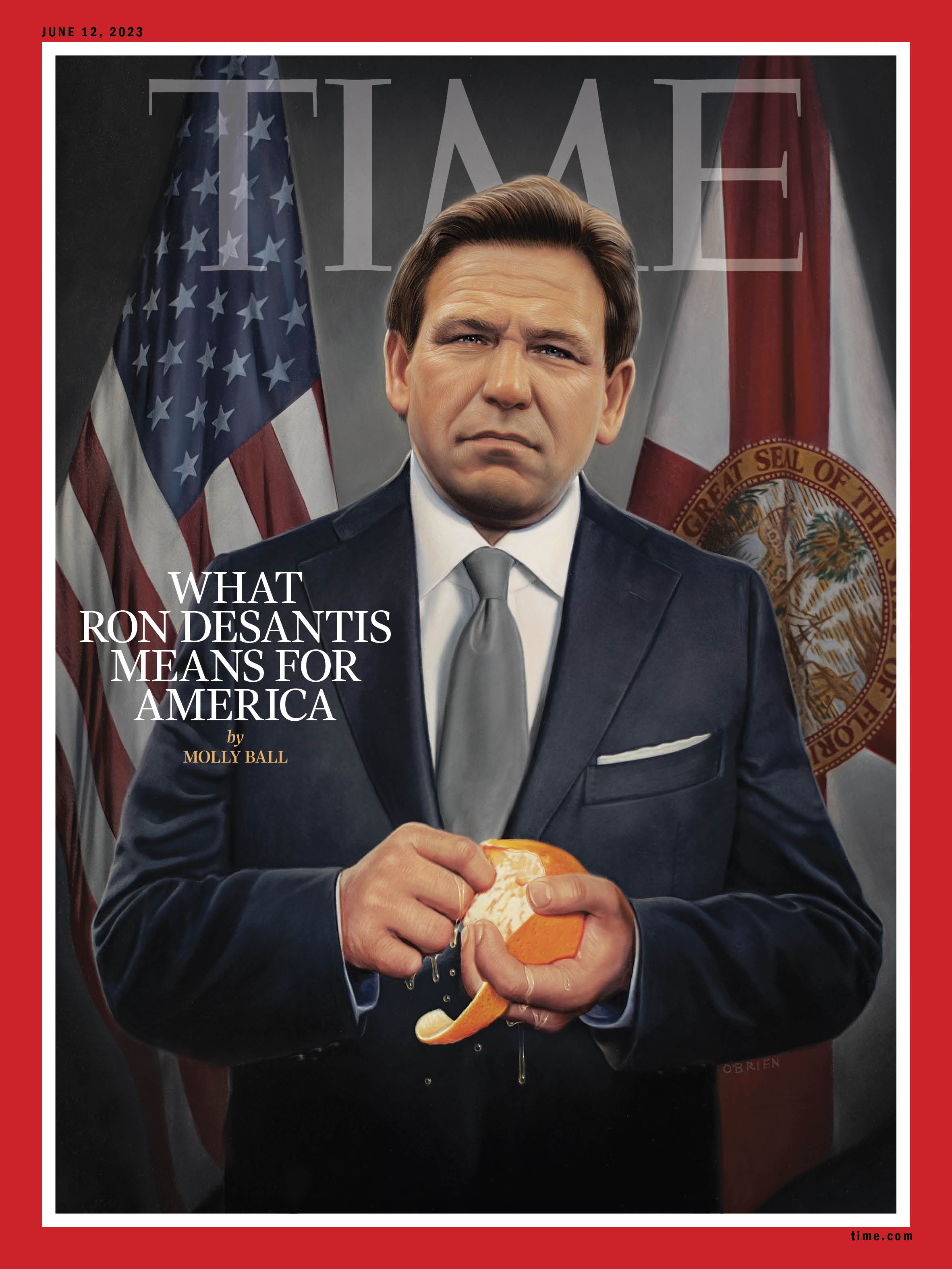
By operationalizing the culture war into a set of concrete policies, DeSantis has transformed the nation’s third most populous state. What was once the butt of jokes about gators and retirees is now the swaggering, Southern-tinged Free State of Florida—where men are men, woke is broke, and business is booming; 1,200 net new residents arrive every day. “It’s in the air, it’s everywhere, it’s amazing,” says former GOP Representative David Jolly, no fan of the vibe shift. “It’s between neighbors, it’s when you go to restaurants, when you go to schools. You’re on one side or the other, and people know it.” A Florida native, Jolly is considering moving his family out of the state.
If critics see DeSantis as a would-be authoritarian, allies see a conservative who gets things done. Many predicted that his hard-charging first term in office would provoke a backlash. Instead the opposite occurred. While Republicans across the country struggled last November, DeSantis romped to a 19-point re-election victory, the biggest win for a Florida governor in decades. What was once America’s paradigmatic swing state now pulsates bright red. For the first time in modern history, registered Republicans outnumber Democrats. The people of Florida seem to like the steady hand—even if it’s an iron fist.
To fans, DeSantis’ success proves that a pugilistic, big-government conservatism that promises ruthless competence instead of Trumpian chaos can win broad support, including a growing share of working-class and minority voters. “We’ve shown that you don’t have to do it the liberal way, and we’re the envy of the nation when you look at our results,” says state representative Randy Fine, a Republican who has sponsored some of DeSantis’ most controversial legislation and may soon be rewarded with an appointment as a university president despite no background in academia. “DeSantis says what he’s going to do and he does it. People like that, even if they don’t agree with him.”

The Blueprint has already done more than just make DeSantis the darling of right-wing media and donors. It has changed the face of American politics. His gerrymandering of the state’s political map added enough red seats to secure the U.S. House of Representatives for the GOP last November. Fellow governors, invited by DeSantis to policy summits where they study his approach, have enacted laws modeled on his policies, affecting millions of lives beyond Florida. And his agenda has set the stakes for the 2024 presidential primary. Donald Trump’s campaign has been notably more focused on transgender issues, education, and “wokeness” than on the tax cuts and vaccine development that might be considered his main presidential accomplishments.
Soon DeSantis is expected to announce his presidential run and become Trump’s chief rival for the Republican nomination. Trump has attacked him relentlessly, denting DeSantis’ standing with GOP voters and sowing doubts about his national viability. But those who have witnessed DeSantis operate say it would be foolish to count him out. “He’s not charming,” says GOP state representative Fiona McFarland. “But he’s a terminator.”
DeSantis’ methods of keeping the legislature in line are not subtle. At one point, a Republican lawmaker was planning to oppose a DeSantis-backed bill until he got a phone call from the governor, who had helped the lawmaker get elected. Without preliminaries, DeSantis barked into the phone, “Do you know why you’re here?”
“Yes,” the startled lawmaker answered. Without saying another word, the governor hung up, two people familiar with the incident told me. Message delivered.
Unlike his predecessors, DeSantis does not roam the halls of the Florida statehouse and spends little time in his office in the legislative building. The office, situated on the ground level, has become code for DeSantis, Politico recently reported. “That’s Plaza’s bill,” lawmakers will say.
DeSantis, 44, was born in Jacksonville and raised in the Gulf Coast city of Dunedin, where his mother was a nurse and his father installed Nielsen TV-rating boxes. A book-smart introvert and talented baseball player, he graduated with honors from Yale University (where I knew him slightly) and Harvard Law School before joining the Navy. As a member of the Judge Advocate General (JAG) Corps, he was stationed at Guantánamo Bay and then deployed to Iraq, where he served as a legal adviser to the SEALs during the 2007 troop surge.
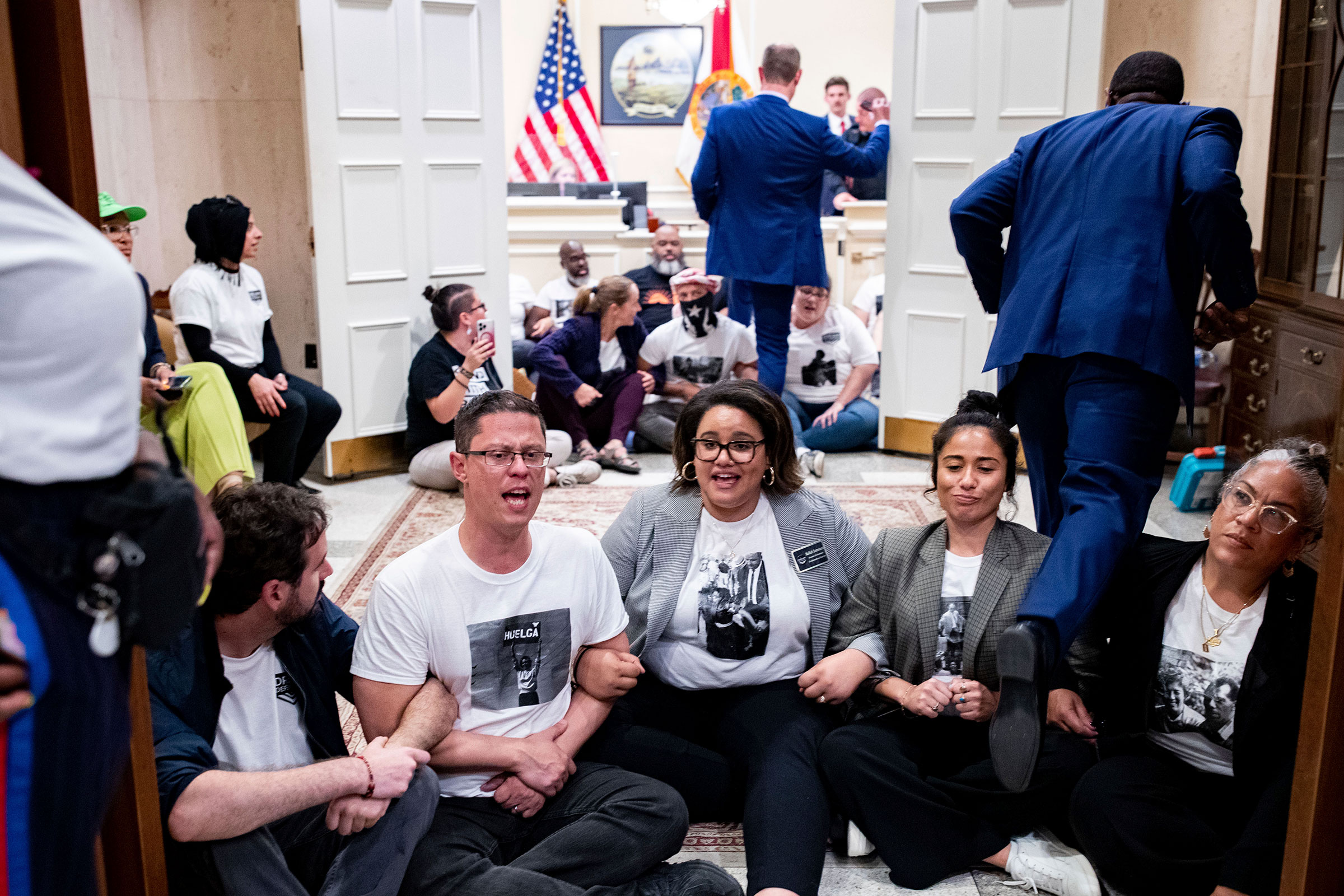
In 2010, DeSantis left active duty and settled near Jacksonville, where he worked as a lawyer and married a local TV anchor, Casey Black, whom he met at a driving range. As the Tea Party fervor crested, he self-published a book of conservative ideas, Dreams From Our Founding Fathers, and traveled to local activist meetings to give talks and sell it. DeSantis was looking for a way into elected office but unsure where to start until he met two Florida consultants, Tim Baker and Brian Hughes, who had made a specialty of electing conservative insurgent veterans. DeSantis thought he might run for state legislature or some other low-level office. The consultants persuaded him he had a shot at a Jacksonville-area congressional district that had just been redrawn to favor the GOP.
The 2012 primary was crowded, and DeSantis had little money or name recognition. The consultants devised a guerrilla strategy designed to tap into the new conservative zeitgeist. Casey, a local celebrity, began using her married name on television. The couple went door to door, using his advisers’ data to target households with the strongest record of voting in Republican primaries. Meanwhile, his consultants, who had agreed to backload their fees, gambled by spending nearly all of the campaign’s meager budget on an ad on Fox News.
DeSantis began to close the gap on his more experienced rivals. He impressed national right-wing groups and won the endorsement of the influential Club for Growth, which brought a flood of cash from donors. He won the seven-way GOP primary by a wide margin, drawing nearly 40% of the vote.
Buoyed by this success, the consultants drew up a plan to raise DeSantis’ profile as he headed to Washington. But the candidate dismissed them: he didn’t want to spend more money with his election to Congress all but assured. It was only when Baker and Hughes expressed concern that the dispute might become public that DeSantis relented, according to two people familiar with the episode. Their role in his early career is not mentioned in DeSantis’ new memoir, The Courage to Be Free, which describes the door-knocking strategy as if it were DeSantis’ own idea. “He has a habit of rewriting history,” one of the people familiar with the episode told me. “There’s Richard Petty, there’s Tom Petty, and then there’s Ron DeSantis petty.”
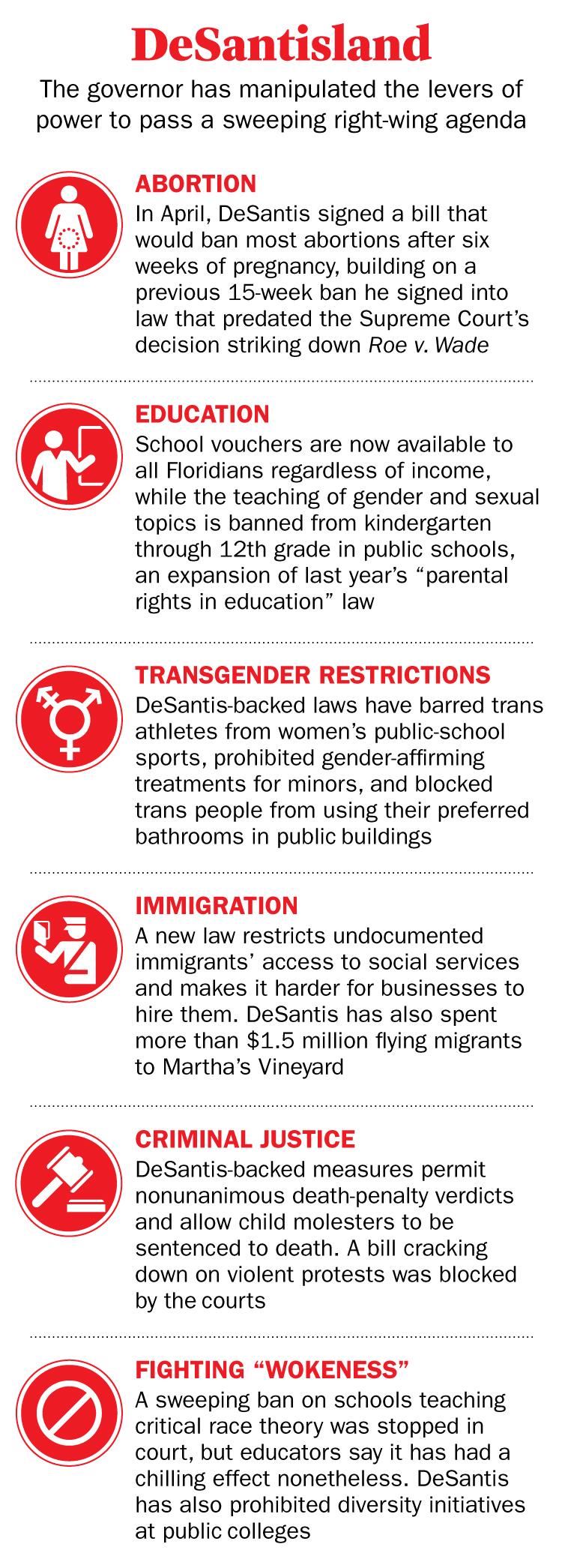
Over three terms in the House, DeSantis was a reliable conservative not known for his people skills. Congressional colleagues describe him as strikingly aloof, rebuffing or ignoring friendly overtures and wearing earbuds to avoid conversation. A co-founder of the right-wing Freedom Caucus, DeSantis in his memoir describes his years in Congress as mostly frustrating. GOP leaders exercised top-down power, he argues, but weren’t willing to fully use their leverage to achieve conservative goals. He does, however, tout his work on the Puppies Assisting Wounded Servicemembers (PAWS) Act, which funded a program providing service dogs to veterans with PTSD.
In 2016, DeSantis briefly ran for the U.S. Senate seat that Marco Rubio had vacated to run for President, but dropped out when Rubio decided to return to the Senate. Instead, DeSantis announced a run for governor in 2018. It was another insurgent campaign: the Florida GOP establishment already had its handpicked candidate, Adam Putnam, the state agriculture commissioner. But DeSantis again read the changing currents of the GOP. He appeared relentlessly on Fox, emerging as a reliable defender of Trump, particularly on the Russia scandal that enveloped the first years of the President’s term.
On Dec. 8, 2017, DeSantis and a fellow right-wing Florida Congressman, Matt Gaetz, hitched a ride on Air Force One to a Trump rally in Pensacola. Along the way, Gaetz urged the President to endorse DeSantis for governor. He described Putnam as a Never Trumper and read aloud a list of negative things Putnam had said about the President. A couple of weeks later, after catching another DeSantis appearance on Fox, Trump endorsed him on Twitter. DeSantis made the most of it, mentioning Trump 21 times in his first debate with Putnam and running an ad that jokingly showed him reading The Art of the Deal to his young children and “building the wall” with toy blocks.
In the general election, DeSantis faced Andrew Gillum, the progressive Black mayor of Tallahassee. In an early post-primary appearance, DeSantis said, “The last thing we need to do is to monkey this up by trying to embrace a socialist agenda.” Democrats decried his verbiage as a racist dog whistle. DeSantis refused to back down or apologize. But while many national observers remember that controversy, in Florida the campaign mostly focused on state issues. “What Ron said to me in 2018 when we were laying out the strategy was, ‘We’re going to nationalize the primary and localize the general,’” Gaetz tells me. “The plan was to run against Putnam on national issues and then paint Gillum as in the pocket of Big Sugar.” In a good year for Democrats, DeSantis defeated Gillum by less than half a percentage point.
Trump has claimed credit for DeSantis’ rise, but one former DeSantis adviser says the governor sees his success as foreordained. “He has a providential belief that he will talk sincerely about. He believes he is exactly where God planned him to be at all times,” the adviser says. “I’m sure he believes, ‘It was nice of Trump to help me kick the sh-t out of Adam Putnam. But it would have happened anyway.’”

The Florida governorship has not always been a powerful position. Until 1968, the governor could serve only one term, and until the 1990s he (Florida has only had male governors) shared decisionmaking powers with six other statewide elected officials. Reforms that took effect during Jeb Bush’s tenure in the early 2000s shrank the elected cabinet to just three members while also giving the executive more say in judicial nominations. At the same time, term limits approved by voters in a 1992 ballot initiative took hold, turning the legislature into a revolving door where lawmakers could no longer amass power over decades. As DeSantis entered office in 2019, the power of Florida’s executive was already at a historic high.
He was determined to use every bit of it. “One of my first orders of business after getting elected was to have my transition team amass an exhaustive list of all the constitutional, statutory, and customary powers of the governor,” he writes in The Courage to Be Free. “I wanted to be sure that I was using every lever available to advance our priorities.” Aides from the time have corroborated this account, describing a thick binder of information that DeSantis proceeded to devour.
Conscious of his narrow victory, DeSantis initially sought to broaden his appeal. “We got elected by the hair of our chinny-chin-chin, so the goal of the transition was to grow the universe of DeSantis supporters in the state of Florida and do better with nonwhite voters, independents, suburban women, and young people,” says Gaetz, who chaired the transition to the governorship. (Once an ally of both men, Gaetz has grown distant with DeSantis since endorsing Trump’s 2024 campaign.) DeSantis approved the sale of smokable medical marijuana, appointed Democrats to prominent posts in the administration, raised teacher pay, and proposed record levels of environmental funding for the Everglades. He posthumously exonerated the Groveland Four, Black men wrongly accused of raping a white woman in 1949. When his proclamation honoring the third anniversary of the massacre at the Pulse nightclub in Orlando was criticized for failing to mention the affected groups, DeSantis’ office reissued it with a new sentence decrying “hatred towards the LGBTQ and Hispanic communities.”
Even early on, though, there were hints of a more assertive approach. DeSantis short-circuited the usual process for state supreme court nominations, allowing him to cement a conservative majority that would be unlikely to overturn his policies, as previous courts had done to his predecessors. He used a new, aggressive interpretation of his powers under state law to remove local elected officials, including Scott Israel, the Broward County sheriff whose response to the Parkland school shooting drew criticism. Previous governors had reserved that right for officials who broke the law, and a state senate special master recommended that Israel be reinstated, but DeSantis pushed through the removal. DeSantis’ support for Everglades funding may have been less about the environment than getting back at the powerful sugar industry, whose generous subsidies he had opposed since his days in Congress and which had spent more than $10 million backing Putnam in the primary. “Sugar is more powerful than Disney here, by far, and he took them on unapologetically,” says Nick Iarossi, a Tallahassee lobbyist and DeSantis ally.

But it was the pandemic, critics and supporters agree, that changed DeSantis. After initially shuttering schools and restaurants, DeSantis grew frustrated by the lack of clear guidance from Washington and the medical establishment. He began doing his own research and soon concluded that much of the early conventional wisdom about COVID-19 was wrong. The spread of the virus could be mitigated but not contained, he believed. Democratic Governor Andrew Cuomo of New York was being hailed by the media for his strong leadership even as he sent infected elderly people back to nursing homes, an act of tragic malfeasance intended to prevent a hospital-bed shortage that never materialized. Studying the emerging medical data, DeSantis concluded such fears were based on faulty models, and he almost certainly saved lives by isolating elderly patients. He soon reopened Florida’s beaches, schools, and businesses while prioritizing protections, vaccines, and treatments for the most vulnerable citizens.
Gaetz, who talked to DeSantis daily during this period, says the governor often brought up the 1918 Spanish flu pandemic, in which people were wheeled onto beaches for sunlight and ventilation. He fretted about the long-term mental-health effects of shutting people indoors and became emotional describing nursing-home residents dying in isolation, prohibited from seeing their loved ones. DeSantis had surveyed the landscape, watched a stampede of governors go one way, and determined he would do the opposite. “It was very binary,” Gaetz recalls. “One group was going to be toast. The other was going to be vindicated.”
The crisis hit right after the 2020 legislative session had concluded. Rather than call back the frightened lawmakers to address it, DeSantis seized new powers for himself. Declaring a state of emergency, he claimed unfettered authority to allocate pandemic funds from the federal government. He overrode local governments and school boards that tried to impose closures or mask mandates, and threatened to remove or withhold pay from local officials who sought further restrictions.
Once receptive to input from outside his orbit, he became convinced of his own rightness. “COVID was definitely the switch that flipped, when he started to become a bully,” says Nikki Fried, who served at the time as agriculture commissioner, the only Democrat elected statewide alongside DeSantis. Having initially welcomed her outreach, she says, during COVID-19 he stopped returning her calls. Fried, who now chairs the state Democratic Party, began calling DeSantis a “dictator.”
At a dinner in Austin in January 2021, Iarossi introduced DeSantis to Elon Musk. The two men proceeded to discuss disease vectors and biotherapies in obsessive detail. DeSantis “was getting the sh-t kicked out of him on CNN,” Iarossi recalls. “And he said to me, ‘Nick, I don’t care what they say about me now. I care what they say six months from now. I’ve done the research, and I think I’m right.’” At the time, loosening restrictions seemed like a risk, but DeSantis’ confidence was unshakable. “Everyone’s in hysteria thinking the world is going to end, all his advisers are telling him not to. But business thrived, the economy thrived, people moved here. It took a year, not six months. But he was right.”

As Trump left office and the pandemic waned, the governor grew more emboldened. In 2021 and 2022, the legislature pushed through DeSantis-backed bills to make it harder to vote, ban vaccine passports, and crack down on “rioting” at protests. The “parental rights in education” bill, better known as “Don’t Say Gay,” prohibited the teaching of sex and gender in early elementary grades, while the Stop WOKE act banned the teaching of critical race theory (CRT) at schools and businesses. DeSantis signed a 15-week abortion ban, contingent on the yet-to-come reversal of Roe v. Wade, and began to express skepticism about the COVID-19 vaccines, appointing a new state surgeon general, Joseph Ladapo, who opposed vaccine and mask mandates while promoting unproven treatments.
Favor-trading was not DeSantis’ style; loyalty was not necessarily returned. At the end of one legislative session, he proceeded to theatrically veto budget priorities of the legislative leaders standing alongside him on the stage.
When it came time to redraw the state’s congressional districts in 2022, legislators proposed a new map that largely preserved the delegation’s balance. A voter-approved constitutional amendment prohibited partisan gerrymandering and sought to protect minority districts, and lawmakers were wary of being slapped down by the courts if they went too far. But DeSantis had read the relevant laws and precedents, and in January 2022 he proposed his own map, which eliminated a majority-Black district in north Florida and gave the GOP a shot at up to four additional seats in Congress.
None too keen on this attempt to usurp their traditional responsibility, legislators ignored DeSantis and passed their own map instead. DeSantis vetoed it. At the same time, he let it be known that Senate president Wilton Simpson, who was running for agriculture commissioner, might not get his endorsement if he didn’t go along. Finally, the legislature relented and passed DeSantis’ map. A few days later, DeSantis endorsed Simpson, and another Republican candidate who had been running for the post dropped out. (The map, which governed the 2022 elections, still faces court challenges.)
The redistricting fight was pure DeSantis. “He did that single-handedly—nobody pushed him—and he was relentless,” one current GOP lawmaker told me. Brian Ballard, a powerhouse lobbyist in Tallahassee and D.C. and an ally of both Trump and DeSantis, says the gambit cemented his dominance. “The [state] senate didn’t lay down for him at first. But he showed he was able to use his political popularity in a way that previous governors had not, and it’s brought him incredible power.”
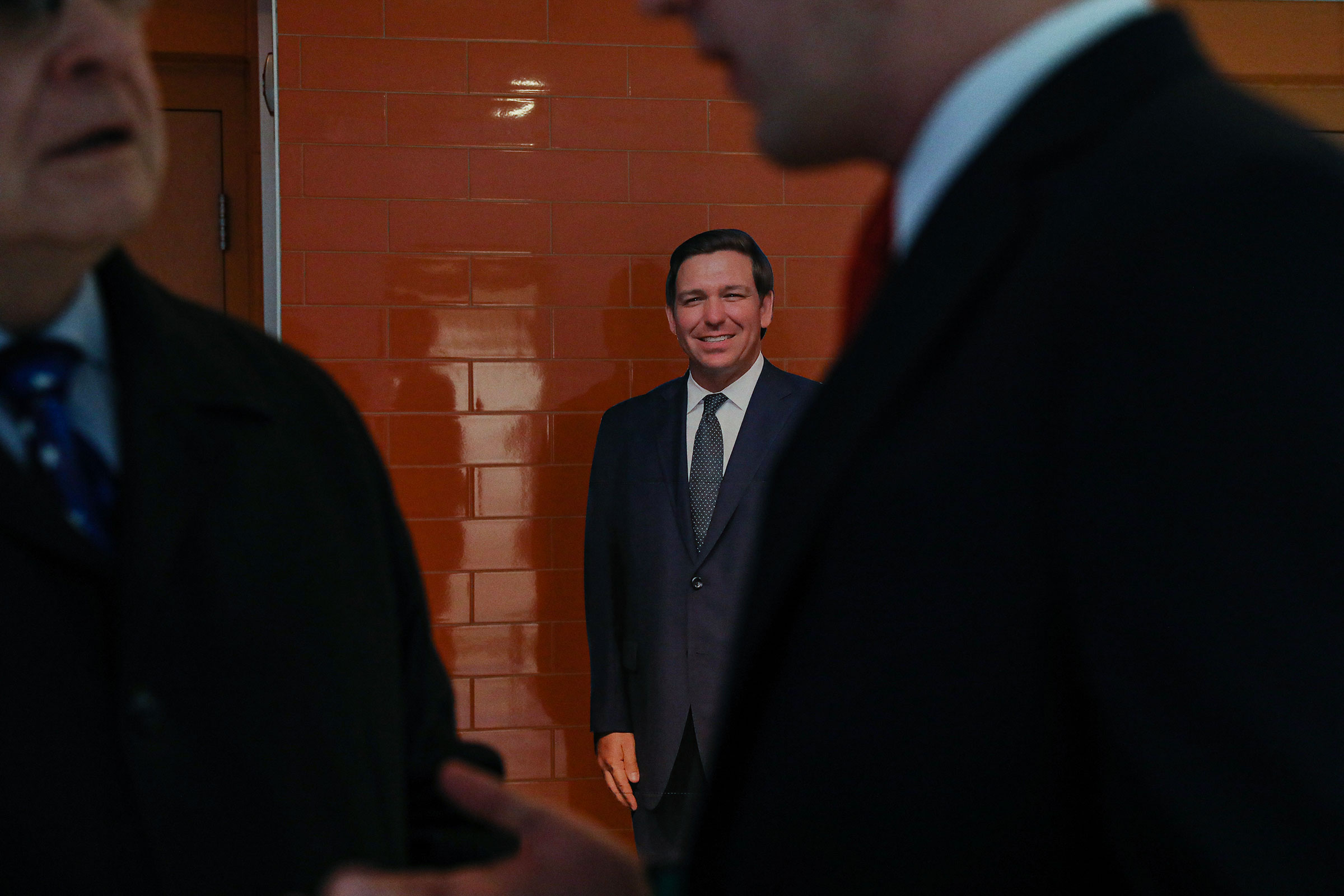
DeSantis’ chief of staff, James Uthmeier, says he has never seen a policymaker so hands-on. “He sits and talks through the nitty-gritty of policy and the budget,” says Uthmeier, who previously served as a senior official in Trump’s Commerce Department. “He’s ingrained in the process in a way I haven’t seen working in the Trump Administration or with other public officials.”
With polls showing DeSantis’ approval ratings among Florida Republicans in the 90s, he moved to spend his skyrocketing political capital. Traditionally, the state senate caucus had recruited candidates for office and funded their campaigns, but DeSantis had other ideas. In statehouse races in the Tampa and Jacksonville areas, he announced his own handpicked candidates, prompting those backed by the senate to drop out. Republicans who went against him drew complaints from their constituents. In the 2022 election cycle, several Florida political consultants told me, their research found DeSantis’ endorsement to be the single most important attribute for GOP primary voters. “In 2020, every member in a strong Republican seat campaigned with a picture of Donald Trump,” says GOP state representative McFarland. “In 2022, they campaigned with a picture of Ron DeSantis.”
His political aims didn’t stop at the statehouse. In another unprecedented move, he issued a raft of down-ticket endorsements as well. Working with the conservative parents’-rights group Moms for Liberty, he backed slates of school-board challengers in districts across the state, targeting boards that had tried to impose school closures and mask mandates during the pandemic. He moved to fill the state bureaucracy with the like-minded, stacking traditionally nonpartisan university and hospital boards with right-wing warriors like the anti-critical-race-theory activist Christopher Rufo. When a locally elected Democratic prosecutor announced he would not enforce DeSantis’ abortion and transgender policies, DeSantis removed him based on his own reading of the relevant statutes. (A court ruled that the rights of the prosecutor had been violated, but that his dismissal could stand.)
DeSantis and his aides went to war with the press, ignoring media requests or publicizing inquiries they considered off-base on Twitter, urging fans to swarm and harass reporters. At press conferences, he delights in berating members of the “corporate media,” often challenging the premise of their questions and accusing them of bias. He scrupulously avoids the mainstream media, once theatrically turning down an invitation to appear on The View. This year, DeSantis’ proposal to make it easier to sue media outlets for libel was one of a handful of initiatives the legislature balked at. (DeSantis’ staff did not respond to multiple requests to interview him for this article.) At the same time, DeSantis carefully tends his image in conservative media. He appears frequently on Fox News, once granting the channel exclusive rights to cover a bill signing, and doles out interviews and exclusives to right-wing influencers and publications. A pair of local digital outlets, Florida’s Voice and the Florida Standard, popped up shortly after DeSantis was elected, helmed by writers with backgrounds in conservative activism. Their funding sources are unknown, but with DeSantis’ help, they frequently break news about the governor, forcing the rest of the press corps to follow their lead. The strategy has made him a household name to the national GOP base, and he attracts large crowds at appearances across the country.

DeSantis’ policies drew the notice of other red-state governors across the country, who began to see Florida as a laboratory for conservative policy. A raft of states have introduced legislation mirroring “Don’t Say Gay,” and many have followed his lead with bans on transgender athletes and CRT. His battle with Disney has galvanized a national GOP war on “woke” business practices like environmental, social, and governance (ESG) investing. DeSantis donor retreats in Fort Lauderdale last July and Palm Beach in February were styled as policy conferences, with attendees including GOP governors. He was not the first Republican governor to transport border-crossing migrants to liberal cities—a gambit the Trump Administration had considered but rejected as too extreme—but by flying them to tony Martha’s Vineyard, he managed to up the ante.
“What DeSantis has done which his predecessors did not do is exploit all of the power inherent in the office of the governor,” says Mac Stipanovich, a longtime GOP lobbyist and operative in Tallahassee who left the party after Trump’s election. “Just because you have the right to do something doesn’t make it right, and his predecessors were conscious of that. There were guardrails. But if he has the right he doesn’t hesitate—and the voters like a strongman.”
As a popular governor with a weak Democratic opponent, DeSantis was virtually guaranteed to win re-election in 2022. But he craved something bigger. With a war chest of more than $100 million, he instructed his campaign that he wanted to run on his record. Admakers were told to focus on his policies—even the ones that didn’t poll well in isolation. The campaign ultimately produced some 70 different commercials, each looking backward at the accomplishments of DeSantis’ first term. Not a single ad focused on his promises for the future.
DeSantis took the resulting landslide as vindication. If past editions of the legislature tended to do DeSantis’ bidding, this year’s session—with a GOP supermajority in both the state house and senate stacked with newcomers he handpicked—was engineered to work his will. DeSantis passed down a list of more than 40 legislative priorities and pushed the lawmakers to get started early. Twice before the official March kickoff, he called special sessions to knock out priorities that could have waited, like insurance reform.
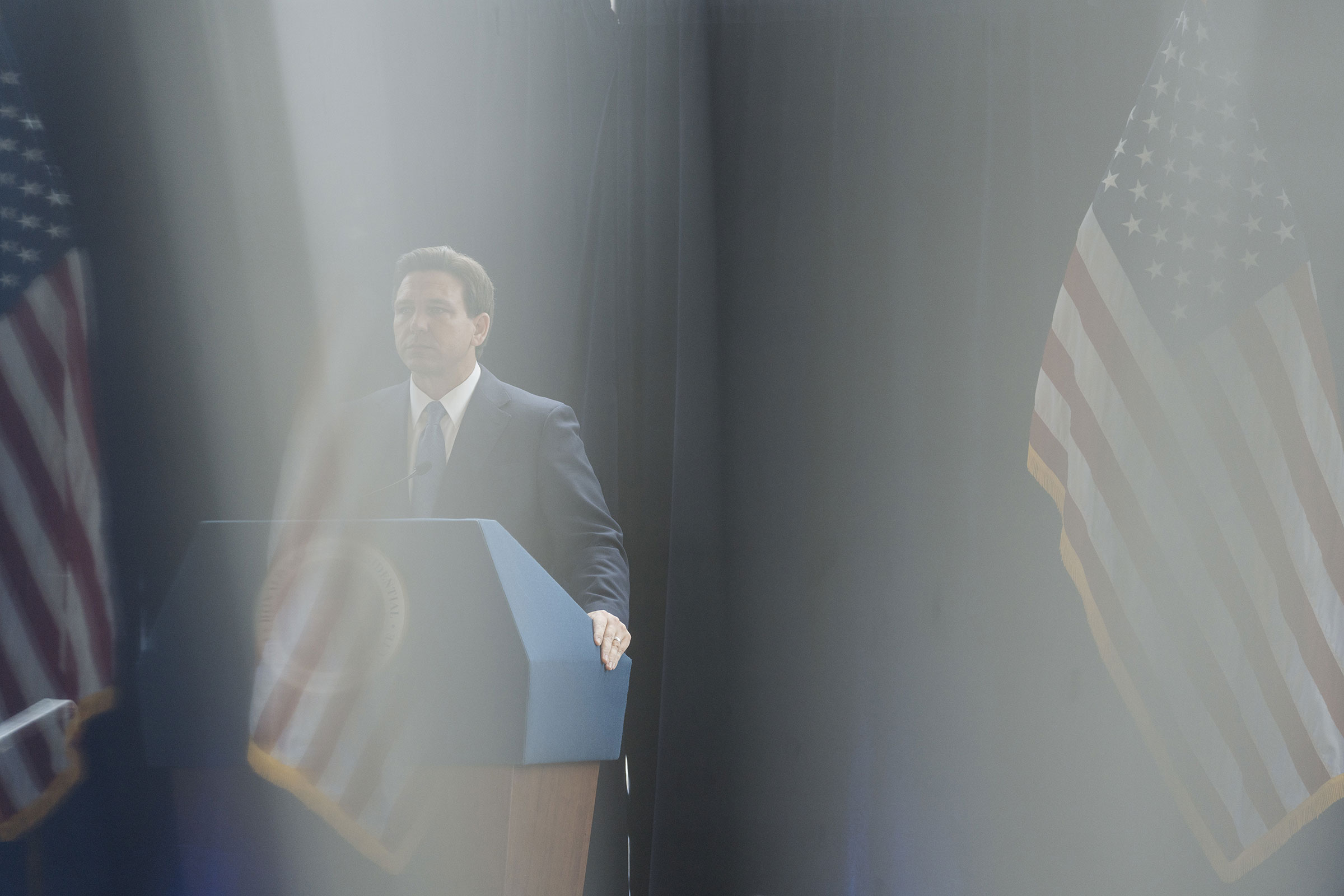
Tallahassee observers believe the flurry was choreographed to tee up the launch of a presidential bid that will place his policy record at its center. But unlike the legislative session, the pre-campaign has not gone according to plan. DeSantis stumbled on foreign affairs out of the gate, drawing harsh criticism for a statement that described Russia’s invasion of Ukraine as a “territorial dispute.” Trump has savaged him in personal terms. Some Republicans worry that DeSantis’ rush to the right on issues like abortion may come back to bite him.
Even allies wonder if DeSantis is cut out for the intense human interaction required in a national campaign. An April trip to D.C. to meet with his former colleagues in Congress ended disastrously, producing a flood of anecdotes about his antisocial ways on Capitol Hill and a slew of new congressional endorsements for Trump. The same bunker mentality that has made DeSantis more feared than loved, enabling him to shut out distractions and dismiss the naysayers, has created an insular operation struggling to do the outreach a presidential campaign requires. His stiff-arming of mainstream media has made it difficult to regain control of the narrative. And Trump’s political rise would seem to show that policy, substance, and governing experience may not count for much in today’s GOP.
But those who have had a front-row seat to DeSantis’ transformation of his state know better than to underestimate him. In his presidential run, allies say, will draw on his Florida record to argue he is both more effective and more electable than Trump. To GOP partisans hungry for confrontation but weary of losing, he offers Trumpian aggressiveness without all the baggage. “What got him here isn’t personality, it isn’t gladhanding,” says Iarossi. “It’s the relentless pursuit of conservative policies that have made Floridians’ lives better and led to a majority of registered Republicans. It’s the result of policies and governing.” —With reporting by Leslie Dickstein and Julia Zorthian
More Must-Reads from TIME
- Donald Trump Is TIME's 2024 Person of the Year
- Why We Chose Trump as Person of the Year
- Is Intermittent Fasting Good or Bad for You?
- The 100 Must-Read Books of 2024
- The 20 Best Christmas TV Episodes
- Column: If Optimism Feels Ridiculous Now, Try Hope
- The Future of Climate Action Is Trade Policy
- Merle Bombardieri Is Helping People Make the Baby Decision
Write to Molly Ball/Tallahassee at molly.ball@time.com
